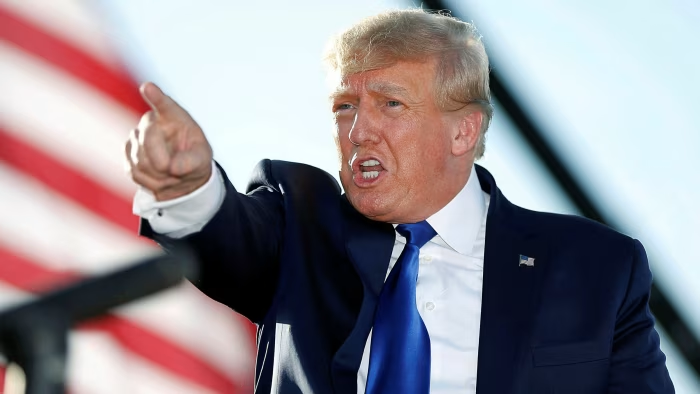One in four Americans have stopped shopping at their favorite stores due to corporate politics and beliefs: Poll

Many Americans are altering their shopping habits or boycotting certain stores in response to corporations aligning their policies with the Trump administration, according to an exclusive poll shared with the Guardian.
A Harris poll found that 40% of Americans have adjusted their spending in recent months based on their moral beliefs. Meanwhile, 31% of respondents expressed a lack of interest in supporting the economy this year—a sentiment more prominent among younger consumers (Gen Z: 37%), Black consumers (41% vs. 28% of white consumers), and Democrats (35% vs. 29% of independents and 28% of Republicans).
One in four Americans (24%) have even stopped shopping at their favorite retailers due to political differences (Black consumers: 35%, Gen Z: 32%, Democrats: 31%). Democrats were more likely to shift their spending habits (50%) compared to Republicans (41%) and independents (40%). Additionally, nearly half of Democrats (45%) admitted they had stopped shopping at businesses with opposing political views, while 34% of Republicans did the same.
This trend suggests that liberal consumers are increasingly using their purchasing power as a form of political expression.
Most recently, this has been evident with backlash against Target, the seventh-largest retailer in the U.S., which traditionally enjoyed strong support from progressive shoppers.
In January, Target announced it was ending some diversity, equity, and inclusion (DEI) initiatives, including a program aimed at increasing Black- and minority-owned brands in its stores. The company cited an effort to “stay more in step with the evolving external landscape.” Following this, calls for a boycott surfaced on social media, and Twin Cities Pride, the group behind the annual Pride festival in Minneapolis—where Target is headquartered—dropped the company as a sponsor in response.
“What is more important is that we send the message that companies do the right thing,” Andi Otto, executive director of Twin Cities Pride, told the Minneapolis Star Tribune in January.
Historically, boycotts have often been driven by the consumer base whose party is out of power in Washington. Under Joe Biden, conservatives targeted brands deemed overly “woke.” A notable example was the boycott against Bud Light after the beer brand collaborated with transgender influencer Dylan Mulvaney. The backlash led to parent company Anheuser-Busch losing $395 million in the following months.
Now, with Donald Trump back in office, liberal consumers are responding in kind.
Following Trump’s victory, multiple corporations began rolling back DEI commitments—many of which had been put in place after the Black Lives Matter protests sparked by George Floyd’s murder in 2020.
Although some companies had discreetly scaled back DEI programs after the Supreme Court struck down affirmative action in higher education, concerns grew over potential legal scrutiny on workplace diversity efforts. But after Trump’s win, some businesses became more open about their rollbacks, with Trump himself vowing to eliminate DEI initiatives.
Walmart announced it would phase out DEI-focused programs, including those supporting diverse suppliers and training programs. Amazon stated it was “winding down outdated programs and materials” related to DEI, while McDonald’s removed diversity goals for its senior leadership. These companies largely attributed their decisions to the shifting legal and political landscape.
The extent of Trump’s influence on DEI in the private sector remains uncertain, but his administration has signaled a crackdown. He previously signed executive orders eliminating DEI efforts in federal agencies, including long-standing civil rights-era policies aimed at preventing discrimination in government contracting.
In response, civil rights activist and Baptist minister Rev. Al Sharpton announced in January that his organization, the National Action Network, would conduct a study on corporations abandoning DEI. By May, the group will select two companies for targeted scrutiny, publicly holding them accountable for backtracking on their commitments.
“Donald Trump can’t make us buy your stuff. The Senate can’t make us buy your stuff,” Sharpton declared in a speech last month. “In the name of Dr. [Martin Luther King Jr.], we’re going to do what King did.”
Despite the political pressure, some corporations remain committed to DEI. Costco, Microsoft, and Apple have stated they have no plans to scale back their diversity initiatives, even amid pushback from conservative activist investors.
The result is a complex and frustrating landscape for American consumers, many of whom are disillusioned with the intersection of business and politics. The Harris poll found that 36% of Americans are attempting to “opt out” of the economy by cutting back on spending altogether to avoid engaging with politically entangled companies.
“Think of this as ‘laissez-faire consumerism.’ Buyers aren’t boycotting, they’re just opting out,” said John Gerzema, CEO of Harris Poll. “Instead of demanding more, they’re simply disengaging with the marketplace and businesses who disappoint them.”
Sources -
https://www.startribune.com/target-wont-be-at-twin-cities-pride-festival-organizers-say/601211617
https://www.bloomberg.com/news/newsletters/2024-03-04/wall-street-begins-its-dei-retreat-as-backlash-grows-big-take
https://nationalactionnetwork.net/newnews/after-trump-delivers-opening-attack-on-federal-dei-programs-rev-sharpton-announces-boycott-of-companies-that-abandon-the-policies/



